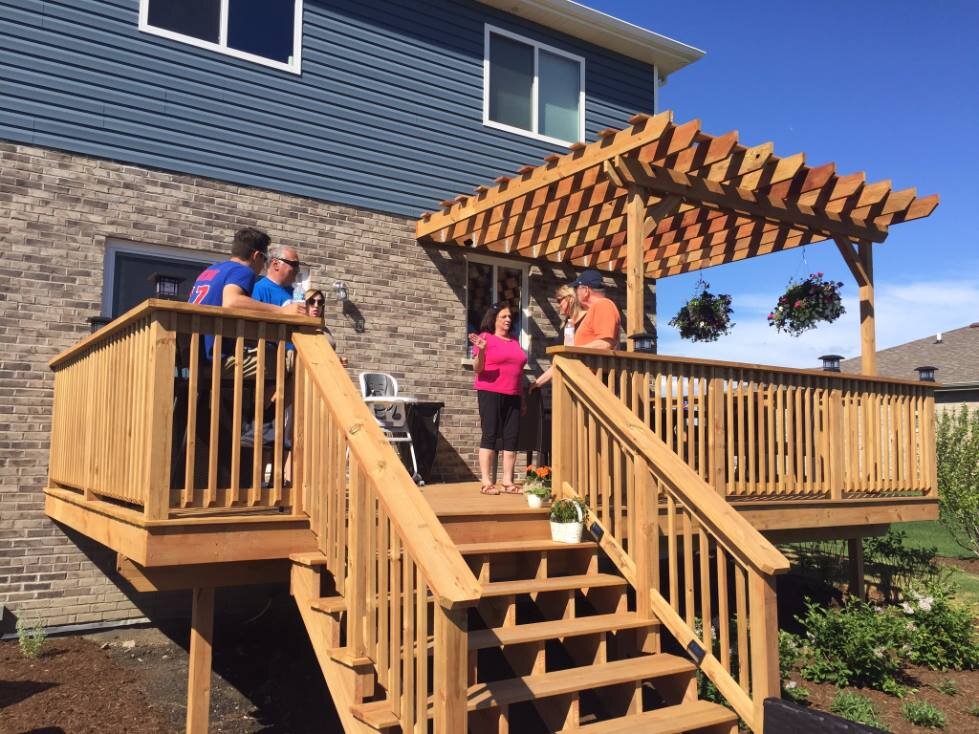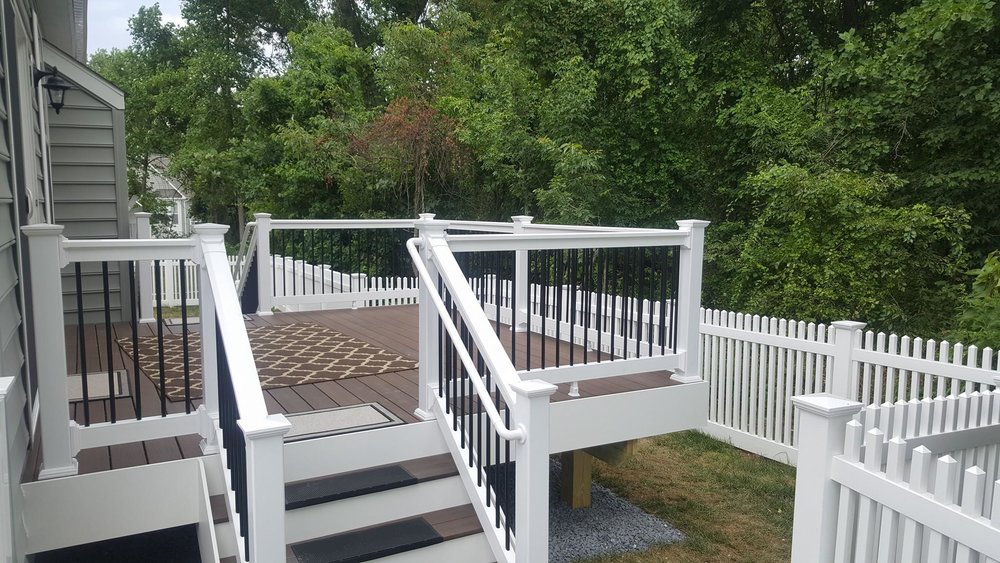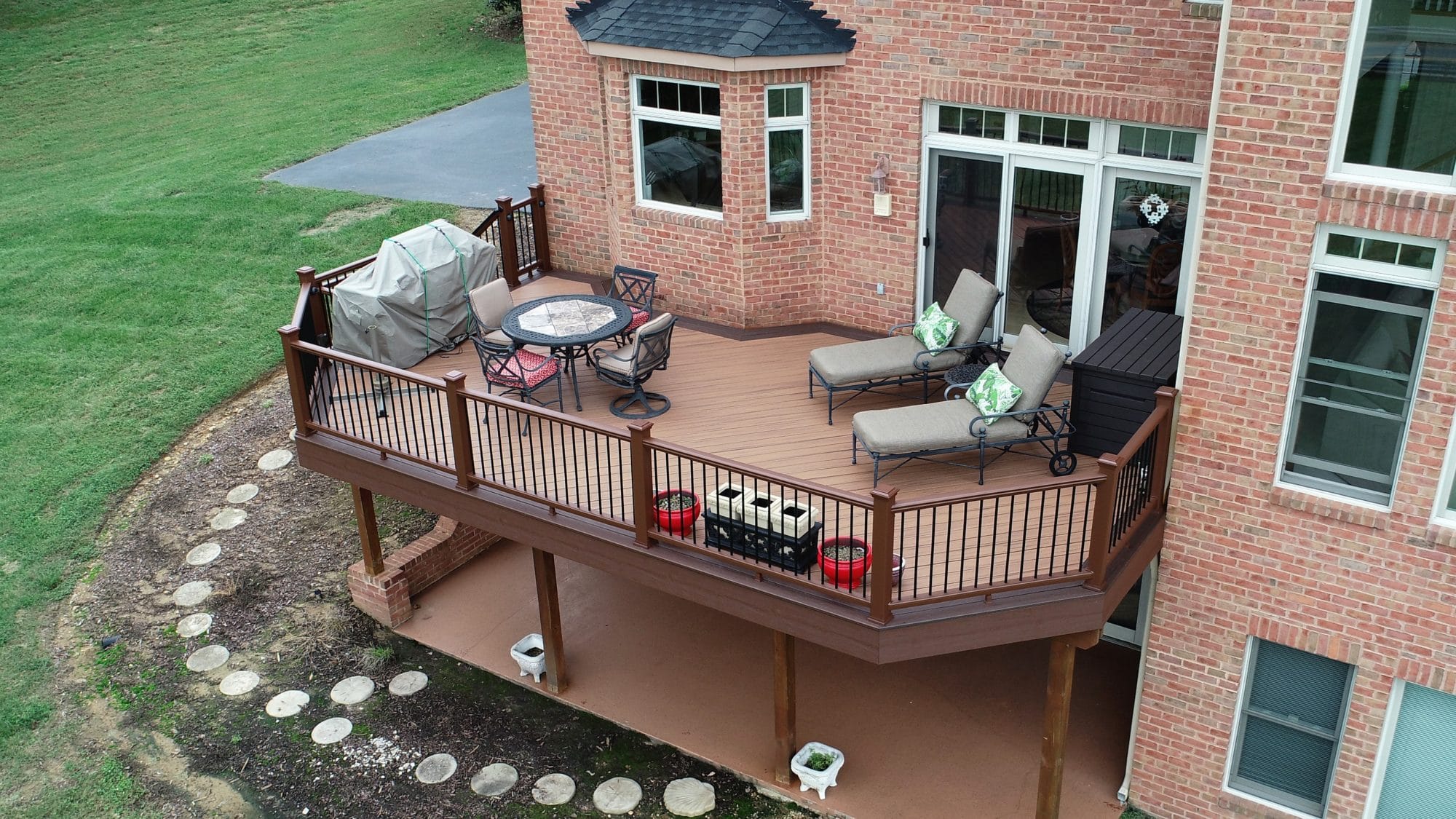Specialist Tips on Choosing the Right Deck Materials for Your Home
Selecting the suitable deck products for your home is a considerable decision that requires careful factor to consider. The choice of products not just affects the looks yet likewise the sturdiness and upkeep of your deck.
Aspects to Think About Before Picking
Prior to choosing deck materials for your home, it is important to thoroughly assess several vital aspects that will influence your decision. The initial aspect to think about is the climate in which you stay. Different materials withstand differing weather in different ways. If you live in an area with high moisture or frequent rainfall, you might want to choose for materials like composite outdoor decking that are a lot more resistant to dampness and mold. On the various other hand, if you reside in a hot and completely dry climate, products like redwood or cedar can be appropriate due to their natural resistance to decay and pests.
Another crucial factor to contemplate is the degree of maintenance you are eager to commit to. Some materials, such as exotic woods, demand regular upkeep like securing and tarnishing to maintain their appearance and durability. On the other hand, composite outdoor decking calls for minimal upkeep, typically just requiring periodic cleansing to maintain its look. Understanding your determination to invest time and initiative right into keeping your deck is crucial for making a decision that aligns with your way of life and choices.

Pros and Disadvantages of Wood Decks
Considering the various elements that influence the selection of deck products, it is important to evaluate the advantages and drawbacks of wood decks. Timber decks supply a all-natural and standard look that many home owners locate attractive. They can be discolored or repainted to match the visual of the home and are fairly easy to function with for DIY projects. In addition, wood is a renewable energy, making it an eco-friendly selection.
However, wood decks need regular upkeep, such as staining or sealing, to avoid rot, decay, and insect infestations - Trex Decking. They are also vulnerable to warping, splintering, and fading as a result of exposure to the elements. In regions with high humidity or extreme weather, timber decks might need extra regular maintenance. Timber decks tend to have a much shorter lifespan contrasted to other decking materials like composite or PVC.
Exploring Compound Decking Options
When evaluating decking materials for your home, discovering composite options presents a low-maintenance and sturdy alternative to standard wood decks. Composite decking is a blend of timber fibers and recycled plastic, designed to mimic the look of wood while using a variety of advantages. One significant benefit of composite outdoor decking is its longevity; it is immune to rot, bending, splintering, and insect damage, making it a resilient selection for your outdoor room.
In enhancement to its toughness, composite decking requires marginal upkeep compared to wood decks. You will not need to stain, seal, or sand composite boards routinely, conserving you effort and time in the future - Trex Decking. Composite outdoor decking is likewise offered in a variety of designs and shades, allowing you to tailor your deck to fit your aesthetic choices
Additionally, composite outdoor decking is green as it is commonly made from recycled materials, lowering the demand for brand-new lumber. While the first price of composite decking might be higher than timber, the long-lasting savings on maintenance and replacement make it an economical alternative for lots of property owners seeking a eye-catching and reputable outdoor decking material.
Recognizing PVC and Vinyl Decking
PVC and plastic decking are modern-day alternatives to standard timber decking products, supplying distinct advantages for homeowners seeking a sturdy and low-maintenance choice for their exterior areas. PVC, or polyvinyl chloride, decking is made from 100% artificial products, offering superb resistance to moisture, fading, and bug damages. This makes PVC outdoor decking a lasting alternative that requires minimal maintenance contrasted to timber. Additionally, PVC decking is readily available in a large array of styles and shades, permitting property owners to tailor their outdoor living areas to suit their preferences.
In a similar way, plastic decking is likewise a synthetic material known for its toughness and reduced maintenance requirements. Vinyl outdoor decking is usually made from PVC, providing similar benefits such as resistance to rot, mold, and mold and mildew. It is additionally a cost-efficient alternative in the future, as it does not require discoloration, securing, or painting like wood decking does. Homeowners can appreciate their outside spaces without the worry of site link comprehensive upkeep with PVC and plastic decking alternatives.
Contrasting Deck Product Costs
To make educated decisions regarding decking materials, assessing and comparing the expenses of various choices is essential for home owners seeking to invest carefully in their outside spaces. When contrasting deck product costs, factors such as preliminary expenditures, maintenance requirements, and longevity must be taken into consideration.

Compound decking, made from a mix of timber fibers and recycled plastics, tends to have a greater upfront price yet reduced upkeep needs. This can cause lasting cost savings in spite of the first investment.
PVC and plastic decking, while low-maintenance and resilient, are amongst the more expensive choices. However, their longevity and marginal maintenance requirements can make them economical selections over time.

Conclusion
In verdict, selecting the best deck materials for your home involves careful consideration of aspects such as resilience, maintenance, and cost. Timber decks provide a classic appearance but need regular maintenance, while composite decking provides a low-maintenance alternative with a variety of designs.
Thinking about the different variables that influence the selection of deck materials, it is crucial to weigh the advantages and drawbacks of timber decks - Trex Decking. Wood decks often tend to have a shorter lifespan contrasted to other decking products like composite or PVC
When examining decking products for your home, exploring composite alternatives offers a resilient and low-maintenance option to conventional timber decks.PVC and plastic outdoor decking are contemporary choices to typical timber decking materials, offering webpage distinct benefits for property owners seeking a resilient and low-maintenance choice for their outdoor spaces. Timber decks use a traditional appearance but require normal maintenance, while composite outdoor decking offers a low-maintenance alternative with an array of styles.